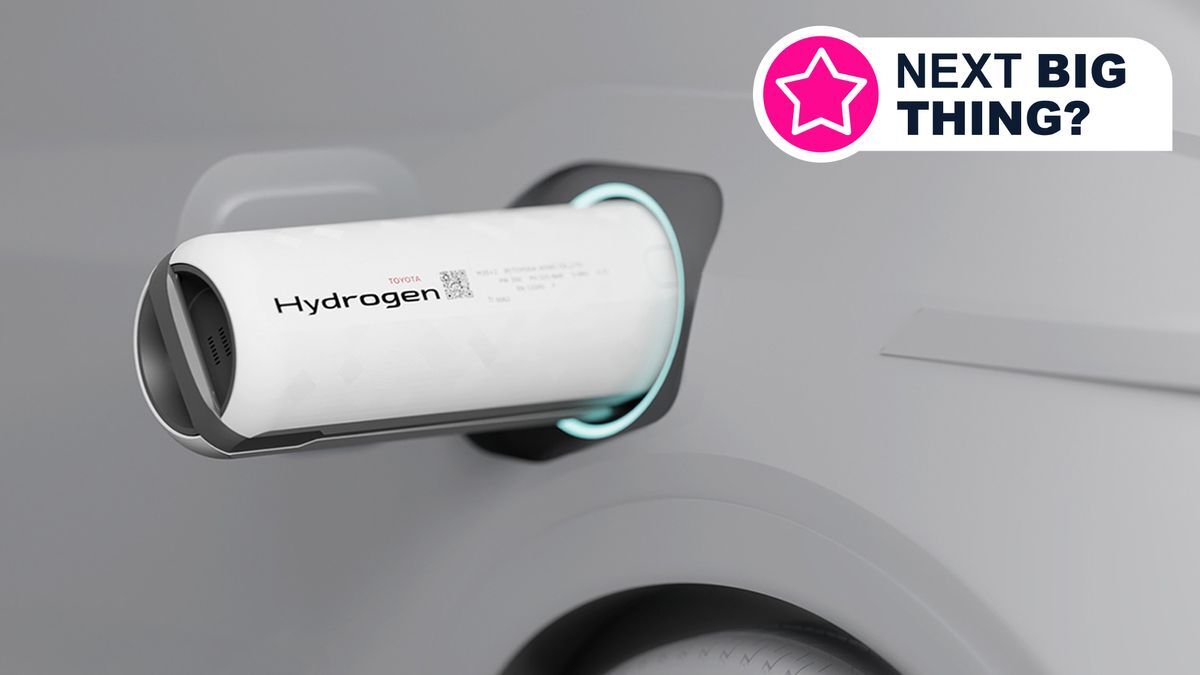So how long until one of those blows up? No matter how good the insulation, cryogenic hydrogen needs cooling to stay stable. You can’t just put it in a tank and store it for extended periods of time.
Portable to me implies that it’s not cryogenic or else it would have to let the hydrogen boil off and can’t do long term storage.
So either these are room temperature and rely in unspecified magic to store the gas, or they’re short term only and require a truck based delivery/recycling system.
The numbers are kinda meh for this. You have for example the gogoro scooters with swappable batteries. Each battery has about 2 kWh, weighs 10 kg.
That hydrogen cartridge I assume is about the same size as the battery and contains 5 liter, roughly a gallon. Hydrogen at 300 bar is 0.75 kWh / liter, so 3.75 kWh. Then it goes through a fuel cell at 50% efficiency and you get 1.9 kWh usage power. Not better than the battery. And if you want to power a car with, say 60 kWh battery car, it means 32 hydrogen canisters to swap.
There is also liquid hydrogen that has 2.36 kWh per liter. With 5 liter you get 5.9 kWh usage power per canister, almost triple the battery, but don’t park these indoors. 10 of these are needed for a 60 kWh car.
For those scooters, the battery solution already works good.
FFS Japan . . stop this noise. Do the hard (and right) thing and go fix your grid. Yes, you got rather screwed post war. Deal with it - and sort it out.
Sounds life a waste disposal nightmare
They’re reusable and we don’t have a problem with 5 gallon propane tanks so I don’t see why these gas cylinders would be worse.
Hydrogen. I don’t know how Toyota has handled it and didn’t read the article yet, but those molecules are so tiny they get into everything and cause problems.
Edit: Article says nothing of use on the subject, and it sounds like this is at the concept phase anyway, so it’s probably vapourware.
Molecules?
Hydrogen gas is H2, so I think it technically is a molecule, since it’s not hydrogen ions
Yup. The atoms are also small, for whatever that’s worth.
Not sure why I got downvoted. Presumably people here are nerdy enough to know hydrogen isn’t a noble gas and doesn’t hang out as a singlet.
doesn’t hang out as a singlet
Technically, since the two electrons in H2 are paired in the ground state, s = 0, which is the definition of a singlet :)
Oh no, has an actual chemist appeared?
I have yet to learn much about the exact physics of bonding.
Sigh…
- Still haven’t solved the problem of hydrogen being developed with less than ideal energy e.g. fossil fuel.
- No one wants to build the infrastructure to push all of that hydrogen around.
- Creating hydrogen still is too costly.
So nice to see a portable solution but still does nothing to address what’s actually keeping hydrogen as a viable alternative.
Every post about hydrogen gets a negative reaction, like someone has proposed using coal to power cars.
There are different suitable applications for different types of energy, it’s not a situation where you have to pick one solution and that’s it. I notice the same happens to some degree with posts about nuclear power.
Hydrogen has potential in things like shipping, aviation, trains and industry. Even if the exact concept in the article doesn’t work, the lessons learned might advance technology in other projects.
I think it’s the knowledge that hydrogen tech is being pushed so hard by the oil lobbies because it’s currently most cheaply made by refining it out of oil using massive amounts of electricity which they can generate by burning more oil.
The astroturfing of hydrogen as a green fuel is disgusting, and straight out of the “Natural gas” playbook that got it piped to virtually every home in the western world over the last 200 years.
I replied to the person above you who made essentially the same comment.
I understand that part and somewhat agree, but still think progress is cool. Especially in a futurology post.
I’ll agree that learning how to better work with and contain hydrogen could have some future benefits, and research should absolutely be made in those directions. Until those key issues are dealt with, hydrogen isn’t useful as a consumer energy source/store since it has been surpassed by batteries/electricity in almost every area it would be useful (and isn’t mature enough to be competitive in the areas it hasn’t been surpassed),
The “problem” is that hydrogen is an extremely complicated way for some people to save like 40 minutes per year over charging an EV in a handful of very specific circumstances, which really highlights just how fucked we actually are in terms of direct climate action.
Like, as it stands an EV already means you get to wake up every morning with a fueled vehicle instead of needing to divert to a disgusting gas station every other week. The only circumstance where charging time is an issue is on long trips, where it adds roughly 20 minutes for 4 hours traveled. and we are supposed to believe that the solution to this is handling a pressurized gas which readily defuses through solid steel containment vessels? Because that is somehow the solution to the one trip per year you take which requires highway charging? The information space here is literally “owning an EV means you can only watch 137 reruns of House in 2025 instead of 138,” but you actually think people are going to be fine with an 800psi hydrogen tank which leaks at a rate of $1 per day?
If you only want to talk about EVs, current technology and specific circumstances, sure.
The negative reaction comes from the fact that most hydrogen is produced by an energy intensive process that uses steam to crack petroleum products, and oil companies like BP have invested millions in greenwashing it to sound good.
I understand there is green hydrogen and blue hydrogen and considered adding a paragraph on that in my comment, but didn’t.
I know most hydrogen isn’t green, but there isn’t a reason it couldn’t be some day.
It makes some sense to me to use the currently more economically viable blue hydrogen in developing technology, but I do agree it is far from perfect.
Considering all this, I still think the negativity to hydrogen progress isn’t proportional.
This is why the negativity is not proportional enough… why are the oil companies pushing for this? It’s not so the wind and solar farms can split water in the future and cut them out of the equation, it’s to delay BEV adoption and try to create a future where they are needed to supplement the horrible efficiencies of hydrogen production, and the need to transport it all over the world.
None of these companies are trying to be altruistic, they are actively destroying the environment and buying influence, to continue making money by doing it.
Batteries are more efficient, more energy dense, cheaper, last for decades and can be 97+% recycled after those decades of service to produce batteries that are even more efficient.
Hydrogen has lost the battle for transport power.
I will cheer any Hydrogen progress that is not attempting to be applied to something that already has a greener alternative.
Hydrogen is a dead end. Always has been. But a bunch of people are stuck with sunk costs now.
Honestly, this is probably the best utility out of FCEB I’ve seen so far. It was always a dead-end for cars, but for short-term portable uses, this is great. There’s actually a HUGE industry around portable butane that could be replaced with something like this.
Recreational, Construction, Culinary, Aviation…imagine replacing all of that with this as a solution, and you’ve got something. We’d obviously need to see some specs to see if it’s possible. It’s not going to make as much money as millions of cars on the road, but perhaps useful enough it will get uptake.
Including culinary in there doesn’t help your cause.
Its just not aiming for the right markets. Its perfect for replacing heavy fuel user where fueling up is already restricted to limited locations like diesel generator trains, massive 18 wheelers and boats, but not for individual car market.
And any number of industrial processes. It’s great for smelting steel from ore, for example.
Or injecting into natural gas. Up to 10% hydrogen is generally tolerated.
A green component is better than nothing, I guess.
Hydrogen is already in development in commercial vehicles.
It’s already in production in industrial vehicles such as fork lifts.
It would’ve been a great transition from fossil fuel, had we embraced it before EV tech was consumer ready. Now it’s just a step backward.
Hydrogen was never and will never be a viable and efficient transportation fuel
Special exception maybe for aviation and rocketry. But even then, methane (if made using green energy and the Sebatier process).
You can get comparable isp with methalox engines without any of the weight required to keep the hydrogen inside the rocket, right?
Hydrogen ISP is still king by a significant margin, but ISP isn’t the whole story – hydrogen comes with additional tank weight (due to lower density) and storage issues (pesky molecular size…). So that trade-off for ISP only really makes sense for an upper stage like Centaur. I’m not sure it makes sense for New Shepherd even…
Pshh you haven’t seen the peaks of blimp technology. On May 6th when they launch the Hindenburg we’ll see who gets the last laugh.
Why do you think that? The fuel production side or the fuel consumption side?
Production, consumption, electrolyzer efficiency limits and capital cost, storage problems, fueling problems, transportation problems, pretty much every aspect of this stuff makes it terrible for use as a vehicle fuel. All green hydrogen efforts should be focused on fertilizer production before anything else.






